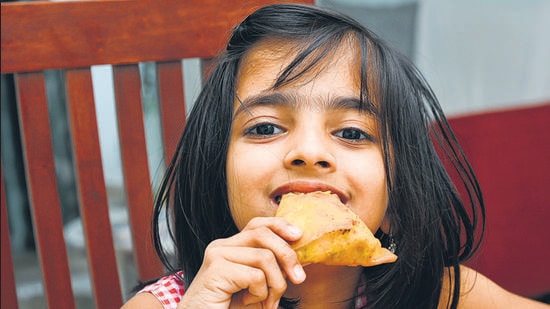Vada pav, samosa make way for sandwiches and fruits in school canteens
Across Mumbai, schools are replacing wafers and soft drinks with fruit and buttermilk in canteens and bringing nutritionists on board to draw-up healthy snack menus.
Mumbai: The recess bell and the aroma of hot samosas and vada pav have gone hand-in-hand for generations of Mumbai’s students, but this may soon be a thing of the past, as city schools are opting for healthier snacks as they resume physical classes after two years of hybrid learning brought on by the Covid-19 pandemic.

Across Mumbai, schools are replacing wafers and soft drinks with fruit and buttermilk in canteens and bringing nutritionists on board to draw-up healthy snack menus.
“We have handed parents a menu card for the week, and we are encouraging them to only send those specific foods in their children’s lunch boxes,” said Swati Popat Vats, president, Podar Education Network. The Podar groups run several schools across the country along with Podar Jumbo Kids, a chain of pre-schools.
The menu includes sandwiches, fruit and cereal, dry snacks like poha or upma among other things.
“Post the pandemic, parents are increasingly worried about the immunity of their children. Lethargy and obesity are directly related to food intake. So, now more than ever, it is important for schools to follow healthy diet programme for their students,” said Vats, who is also president of the Early Childhood Association for Primary Education and Research (ECA-APER).
At Campion School, the management decided to implement a strict “no junk food” policy on campus. So much so that even for birthdays, the school insists that instead of cake and chocolates, students should share fruits or stationery with classmates.
“Instead of chocolates, we give stationery including books or pens to our classmates and this exercise is more fun because it’s almost like giving gifts to everybody,” said a class 9 student of Campion School.
The debate on eating healthy first started nearly a decade ago with both the Council for Indian School Certificate Examinations (CISCE) and the Central Board of Secondary Education (CBSE) board’s directive to their affiliated schools to stop selling junk on campus. By 2019, increasing cases of obesity among children forced the Food Safety and Standards Authority of India (FSSAI) to come out with regulations with respect to diet of school children.
While FSSAI, as part of the Eat Right India project, has banned sale of food items high in fat, sugar and salt in school canteens hostel kitchens as well as within 50m radius of the school premises, its implementation still remains restricted to a fraction of schools.
School principals said that the pandemic has forced a change. Two years of offline learning and restriction on outdoor activities has had a direct bearing on children’s health with many doctors reporting increased cases of lifestyle diseases such as obesity, diabetes and hypertension.
Dr Sweta Budyal, an endocrinologist working with Fortis Hospital said that based on children that have visited her in the past few months, many have reported a six to eight kilo increase in their weight post the pandemic. “Most children were home-bound due to the lockdown and with schools also being conducted online, very little activity was happening on a daily basis. This has led to increase in type 2 diabetes amongst adolescents,” she said.
Campion School at Cooperage disallowed its students from carrying packets of wafers, soft drinks, chocolates or fried items to school for lunch for some years. Now, school authorities have gone a step further towards ensuring that students indulge in healthy eating.
“Recently, we asked a nutritionist, who is also the parent of one of our students, to go through our school canteen menu to suggest changes to ensure children eat healthy food even when they’re not at home,” said Fr Francis Swamy, principal.
“The primary goal is to ensure children eat. We can’t have students fussing over bland food because it is healthy. So a dietician helps us form a menu which can be implemented and at the same time, we also bring parents on board to understand how well the same can be implemented over the academic year,” said Kavita Agarwal, director of DG Khetan International School, Malad.
However, schools are unable to control the sale of junk food outside their premises. “Fact is, children love vada pavs and samosas and even if schools stop selling these, it is very easily available outside. We need better parental control on such matters, and only when parents and school team up will such menace be stopped,” the principal of a suburban school said.
Clinical nutritionist Dr Nupur Krishnan, whose 13-year-old son attends Campion School said the first aim of a nutritionist is to ensure that children are not forced to eat bland food in the name of health.
“When you force children to not eat food that they love--pizza, burger or pasta and maggi, they tend to retaliate. Instead, schools should bring professionals on board to put together a healthy menu that can include tasty food but with healthy ingredients,” said Dr Krishnan, who is part of the canteen and food safety committee at Campion School.
This committee not only looks at the menu but also ensures food safety protocols are maintained on campus, she added.




